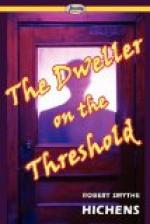The street was deserted. No policeman passed, regarding him with suspicion, and Mailing went on sentinel duty. The dark house fascinated him. More than once a desire came to him to make an effort for the release of Marcus Harding, to cross the street and to hammer brutally at the green door. He recalled Henry Chichester’s strange sermon, and he felt as if he assisted at the torture of the double, which he himself had imaginatively suggested to the two clergymen in Lady Sophia’s drawing-room. Ought he not to interrupt such a torture?
Midnight struck, and he had not knocked. One o’clock struck; he had paced the street, but had never gone out of sight of the curate’s door. It was nearly two, and Mailing was not far from the High Street end of the thoroughfare when he heard a door bang. He turned sharply. A heavy uncertain footstep rang on the pavement. Out of the darkness emerged a tall figure with bowed head. As it moved slowly forward once or twice it swayed, and a wavering arm shot out as if seeking for some support. Malling stood where he was till he saw the broad ghastliness of Marcus Harding’s white face show under the ray of a lamp. He discerned no eyes. The eyes of the unhappy man seemed sunken out of recognition in the dreadful whiteness of his countenance. The gait was that of one who believes himself dogged, and who tries to slink furtively, but who has partly lost control of his bodily powers, and who starts in terror at his own too heavy and sounding footfalls.
This figure went by Malling, and was lost in the lighted emptiness of the High Street. Malling did not follow it. Now he had a great desire, born out of his inmost humanity, to speak with Henry Chichester. He made up his mind to return to the curate’s door: if he saw a light to knock and ask for admittance; if the window was dark to go on his way. He retraced his steps, looked up, and saw a light. Then it was to be. That man and he were to speak together. But as he looked, the light was extinguished. Nevertheless he struck upon the door.
No one answered. He struck again, then stepped back into the roadway, and looked up at Chichester’s window. The curate must surely have heard. Yes, for even as Malling gazed the window moved. No light appeared. But after a pause a voice above said:
“Is that you, Mr. Harding?”
The dim figure of a man was apparent, standing a little back and half concealed by a darkness of drooping curtains.
“It is I—Evelyn Malling,” said Malling.
The form at the window started.
“Mr. Malling!” the words came uncertainly. “What is it? Has—has anything happened to—why do you want me at such an hour?”
“I chanced to be in your street and saw your light. I thought I would give you a hail.”
“Do you mean that you want to come in?”
After a short pause Malling answered, “Yes.”
“I cannot let you in!” the voice above cried out lamentably.




